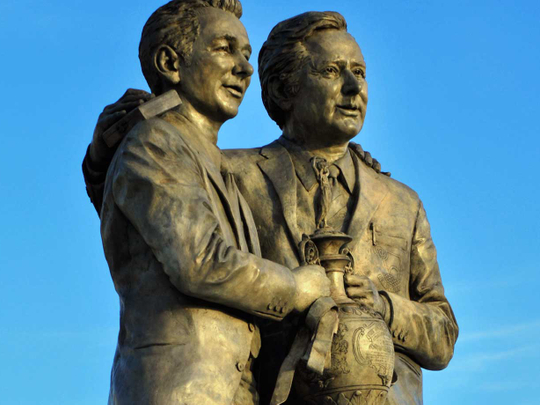
London: Nottingham Forest’s double European Cup-winning team, creators of one of the all-time football miracles under the management of Brian Clough and Peter Taylor, are being lined up for a place in the hall of fame at the National Football Museum.
Talks have begun behind the scenes about arranging an event to honour the team that almost implausibly won the 1978 First Division championship in their first season after promotion and went on to back-to-back European Cups as well as reaching three successive League Cup finals, winning the first two. Forest’s achievements from 1977 to 1980 also included beating Barcelona in the European Super Cup and going on a 42-match unbeaten run in the league, a record that stood for 25 years until Arsenal’s 49-game sequence from May 2003 to October 2004. Clough had inherited a team that was 13th in the old Second Division when he took over in 1975, only five points above the relegation places, but he and Taylor assembled a side that replaced Liverpool as the champions of Europe despite recording the fifth lowest-ever points total for a promoted team.
They managed it from a starting position where the club had been getting sub-8,000 crowds and were so hard-up financially they had resorted to holding a summer cheese-and-wine event to raise money from local businesses. That team have always been overlooked by the voting panel for the hall of fame but the release of the film I Believe In Miracles last year led to a petition being set up by supporters to argue that Clough’s men had never received enough recognition. Six other teams have been inducted in the hall of fame on the back of historic success, starting with Preston’s “Invincibles”, the Busby Babes of the 1950s and Manchester United’s European Cup winners of 1968. The Liverpool team of 1978 have been inducted, after winning their second successive European Cup, along with England’s 1966 World Cup winners and the Manchester City side that won the league, the FA Cup and European Cup-Winners’ Cup from 1968 to 1970.
Aston Villa have also been honoured because of their European Cup success in 1982. Forest’s case was always that the other clubs all deserved to be honoured but that it was difficult to understand why Clough’s team were continually overlooked when their trophy count was clearly superior to some of the sides that had already been inducted. Forest’s unbeaten run was also significantly longer than Preston’s 23 matches from 1888 to 1889 and they deposed Liverpool as league champions in 1978, as well as beating them in the League Cup final and then knocking them out of the European Cup the following season.
From December 1977 to January 1980 the team from Anfield, recognised as one of the more formidable club sides in history, failed to score in eight of their 10 meetings with Forest. The museum has now been in touch with Nottingham city council about arranging a stand-alone event that would not depend on its voting panel. There is an acceptance behind the scenes that Forest should have been inducted before now and, though the talks are only at an early stage, there is a desire to recognise one of the more unorthodox success stories in English football.












